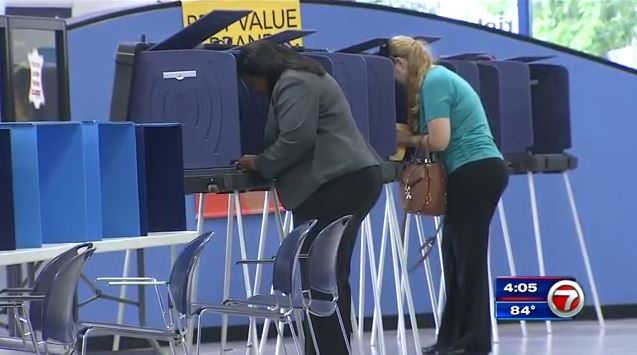TALLAHASSEE, Fla. (AP) — Florida voters will go to the polls Tuesday to decide whether Sen. Marco Rubio should serve a second term and medical marijuana should be more broadly legalized as well as to pick at least eight new U.S. House members. The state and its 29 electoral votes will also play a significant role in the presidential election. Here’s a look at the races and issues facing Florida on Election Day.
U.S. SENATE
Incumbent Rubio is facing Democratic U.S. Rep. Patrick Murphy in a race that’s almost become a referendum on Republican presidential nominee Donald Trump. Murphy has repeatedly criticized Rubio for still supporting the man Rubio said was an erratic conman who couldn’t be trusted with the nuclear codes.
Rubio, 45, has walked a tightrope of condemning Trump’s words and behavior while maintaining that he’ll vote for him because he disagrees with Democratic nominee Hillary Clinton on virtually everything. Rubio has said Murphy unequivocally supports Clinton, a candidate that most people don’t trust. The other two running themes of the campaign have been Rubio’s missed votes while he was running for president and Murphy’s resume embellishments.
Murphy, 33, has cast Rubio as someone who cares more about his political ambitions than serving in the Senate, while Rubio has said Murphy has little to show for his two terms in the House. Rubio has also said Murphy has misled voters by claiming to be a certified public accountant and a small-business owner. Murphy is a licensed CPA in Colorado, but not in Florida, where he worked for an accounting firm, and he was a part owner of a business that was established by his wealthy father.
TRUMP VS. CLINTON
Florida’s 29 electoral votes are the most of any state whose elections could swing either way. If Trump loses Florida, it would be nearly impossible for him to find a path to the White House. That’s why the campaigns and political committees are spending more on television ads here than any other state.
The vote is expected to be close, with several polls in the final weeks showing the race a virtual tie. Early voting numbers are also indicating a close race. Republicans cast 2.47 million ballots by mail or at early voting sites, compared with 2.56 million cast by Democrats. That means independents, who cast 1.23 million early votes, will have a strong sway in the election.
Florida supported Democrat Barack Obama in 2008 and 2012, Republican George W. Bush in 2000 and 2004, Democrat Bill Clinton in 1996 and Republican George H.W. Bush in 1992. The best example of Florida’s unpredictable electorate and importance in a presidential election was in 2000, when it took five weeks to settle the state’s election, and thus the presidency. Bush beat Democrat Al Gore by a mere 537 votes.
CRIST COMEBACK?
Former Republican Gov. Charlie Crist is hoping to revive his political career as a Democrat by beating Republican U.S. Rep. David Jolly in a St. Petersburg-area congressional district that now leans Democratic. Crist lost the 2010 U.S. Senate race as an independent and the 2014 governor’s race as a Democrat.
That seemed to end what was one of the most successful Florida political careers. As a Republican, Crist served in the state Senate and was elected statewide as education commissioner, attorney general and finally governor in 2006. He was considered a potential vice presidential pick for Republican John McCain in 2008. He likely would have won re-election as governor, but he decided to run for Senate instead.
His career turned steadily downward after he was chased out of the Republican primary by Rubio, the eventual winner. But Crist is still popular in his hometown, making Jolly the most vulnerable incumbent House member on the ballot.
U.S. HOUSE
Florida will send at least eight new members to the U.S. House, partially because the state Supreme Court ordered lawmakers last year to redraw congressional districts to comply with the state constitution.
Republican U.S. Reps Jeff Miller, Ander Crenshaw, Richard Nugent and Curt Clawson are retiring, Murphy and Democratic U.S. Rep. Alan Grayson decided to run for Senate instead of seeking a second term, Democratic U.S. Rep. Gwen Graham decided to explore a run for governor after her district became more Republican after the maps were redrawn, and Democratic U.S. Rep. Corrine Brown lost a primary in a heavily redrawn district. That number could grow. Crist is running a strong race against incumbent Jolly, and Republican U.S. Reps. John Mica and Carlos Curbelo are in competitive races.
MEDICAL MARIJUANA
Florida voters will be asked for the second time in two years to approve a constitutional amendment that would legalize medical use of marijuana and broaden access beyond the limited therapeutic applications approved by the legislature.
The ballot question needs at least 60 percent support to pass, a threshold it barely missed in 2014, when 57.6 percent of voters backed the idea.
The effort is spearheaded by millionaire personal injury lawyer John Morgan, who has spent several million dollars pushing for medical marijuana. The measure seems to have more support than it did two years ago, especially after the Legislature failed to pass a bill that would expand a 2-year-old law that allows limited medical use of noneuphoric marijuana.
FLORIDA VOTERS
Florida has nearly 12.9 million voters. They break down like this: nearly 4.9 million Democrats, nearly 4.6 million Republicans and more than 3.4 million voters not registered with either major party. That’s almost 1 million more voters than the 2012 presidential election, when there were fewer than 4.3 million Republicans and nearly 4.8 million Democrats. Although Republicans have had bigger gains than Democrats since 2012, the fastest growing voting block is Floridians who don’t register with a party at all. That number has grown by 517, 026.
Copyright 2024 The Associated Press. All rights reserved. This material may not be published, broadcast, rewritten or redistributed.

